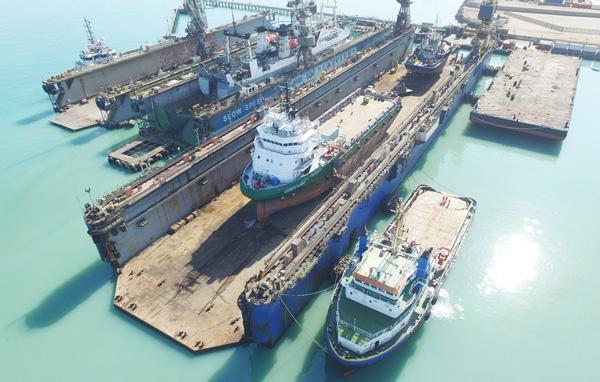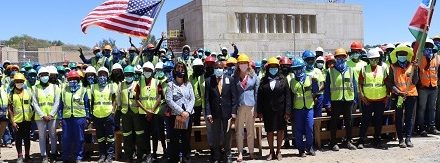
Oil price, industry slump catch up with dry docks

Following a 50% decline in revenues, ship repair company, Elgin Brown & Hamer (EBH), operating the three floating docks in Walvis Bay harbour, had to rationalise its local operations. Staff retrenchment was one of the options to reduce overheads fast.
The Namibian Ports Authority is a 50% shareholder in EBH Namibia together with EBH operating out of South Africa.
This week however, EBH Namibia announced it has reached an agreement with the Mining, Metal, Maritime & Construction Union to mitigate the impact of the retrenchment process, saying the agreement marks a pivotal milestone in stabilisation process to ensure the future sustainability of the company.
EBH Namibia announced its stabilisation plan in April 2016, in the wake of the 50% decline in revenue as a result of the sustained low oil price and subsequent decrease in docking activity. The stabilisation plan included first and foremost several ‘non-HR’ performance improvement projects (PIP) and cost-cutting initiatives.
“We are extremely pleased to have concluded an amicable agreement with the union regarding the retrenchment process, following some two months of constructive engagement and negotiation. To arrive at a mutually agreed solution is a positive step forward for both parties; as well as being in the best interests of our employees,” said Hannes Uys, Chief Executive Officer at EBH.
EBH management and the union agreed on several points relating to the retrenchment process, including terms surrounding an early retirement option and the criteria for selecting those employees to be retrenched.
“It has been an extremely challenging time for all of us at EBH Namibia, and particularly for those affected by the retrenchments. To lose some of our valued staff is deeply regrettable, and we have made every conceivable effort to ensure the least number of retrenchments as possible under the circumstances.
“Our PIP initiatives are not only aimed at short-term cost reduction and performance improvement; but will be the essential operational ‘compass’ by which we will steer this ‘ship’ going forward to ensure that we are sustainable in the long-term,” Uys said adding that retrenchments are a last but unavoidable resort.
“It was crucially important to appropriately re-size and scale the business in accordance with prevailing market conditions to ensure continued viability and long-term sustainability. Furthermore, it should be noted that, while we are now looking forward to a resurgence of the global oil, gas and maritime sector (conservatively projected for mid-to-late 2017), we are also exploring a number of diversification opportunities in order to decrease our exposure in only one key market” he said.
“Skills retention is critical to our business going forward, to ensure our well-known high levels of quality and client service continue. To this end we have taken a very strategic and selective approach to our re-sizing process, to ensure that the company is still appropriately resourced and can quickly and effectively respond to any market resurgence going forward” said Uys.
Ultimately, this agreement together with our stringent adherence to the ethos of PIP and continuous improvement going forward, will pave the way for EBH Namibia to continue our role as an important contributor to Namibia’s economy and as a major service provider on the west coast of Africa, to the international maritime and offshore oil and gas industry,” Uys concluded.













































